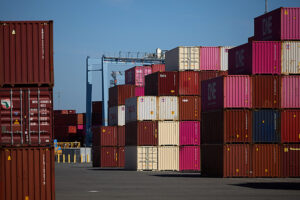Coronavirus: Iran’s deputy health minister tests positive as outbreak worsens

Iran’s deputy health minister and an MP have both tested positive for the new coronavirus, as it struggles to contain an outbreak that has killed 16.
The country is one of three hot-spots outside China causing concern that the virus could be becoming a pandemic.
The deputy minister, Iraj Harirchi, had on Monday denied covering up the scale of the outbreak. He appeared to be in discomfort as he spoke to reporters.
Iran has reported 95 cases, but the actual number is thought to be higher.
The director general of the World Health Organization (WHO) has said the sudden increase in cases in the country is “deeply concerning”.
US Secretary of State Mike Pompeo said on Tuesday that Washington was concerned that Iran may have concealed “vital details” about its outbreak and urged all nations to “tell the truth about the coronavirus”.
More people have died in Iran from the virus than anywhere else outside China. The two countries have strong trading links.
The other countries currently in the spotlight are South Korea and Italy, where cases have surged in recent days.
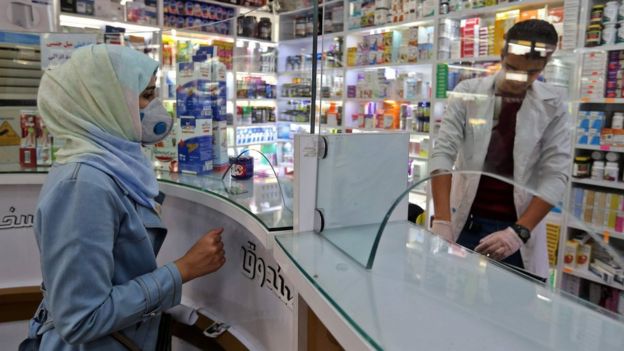 Image copyrightAFP
Image copyrightAFPMore than 80,000 cases of the Covid-19 respiratory disease have been reported worldwide since it emerged late last year. About 2,700 patients have died – the vast majority in China.
But the situation in Iran – home to holy sites that attract millions every year and in a region where several countries have weak health systems – has caused great concern about a potential mass outbreak in the Middle East.
On Tuesday an MP from the Iranian capital Tehran, Mahmoud Sadeghi, also said he had tested positive for the virus.

A conflict between religion and science
By Rana Rahimpour, BBC Persian
The reports that we are receiving from cities around Iran suggest that the number of cases is actually much higher than the Iranian authorities are giving.
Unlike in Italy, Iranian officials are refusing to impose quarantines in areas affected by the outbreak. They say quarantines are old-fashioned and that they do not believe in them.
The Shia shrines in the cities of Qom and Mashhad are still open, despite Qom being a hotbed of the virus.
There are grand ayatollahs in Qom who believe that its shrine, which attracts millions of pilgrims from around the world, and its important seminary, which hosts many foreign religious students, are the pride of the Shia world.
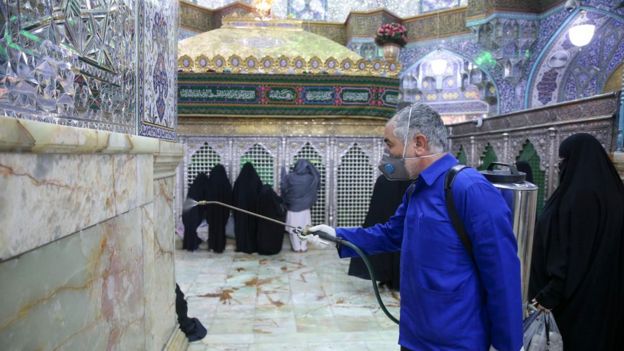 Image copyrightAFP
Image copyrightAFPShutting them down would be a huge step for the clerics and not one that they would be likely to take unless they come under international pressure.
We can see the clear conflict between religious conservatism and science.
Iran also lacks the medical equipment it needs to help contain the outbreak. It has run out of masks and does not have enough testing kits.
A number of medical workers have also been infected, so there is a worry that they will soon run out of doctors and nurses to attend to those with the disease.
The majority of Iranians are extremely worried.

What’s happening with the virus globally?
A hotel in Tenerife, in Spain’s Canary Islands, is in lockdown after a doctor from Italy visiting the hotel tested positive for the virus.
Hundreds of guests and staff remain at the hotel, but are being allowed to leave their rooms.
Italy has confirmed more than 320 cases in recent days, making it the worst-affected part of Europe. The confirmed deaths of three more people – all in their eighties – on Tuesday brought the total number of fatalities to 10.
In a bid to control the outbreak, several small towns in the north have been put under strict quarantine, meaning 50,000 people will be unable to leave those areas without special permission for two weeks.

However, there are signs the virus is spreading, with new cases reported on Tuesday in Tuscany, Sicily and Liguria. Still, Italian Prime Minister Giuseppe Conte said his country remained safe for travel and tourism.
Also on Tuesday a plane carrying 140 Turkish nationals from Tehran to Istanbul was diverted to the Turkish capital, Ankara.
Turkey has closed its border with Iran over the virus outbreak but initial examinations of those on the plane did not find any sign of infection, Turkey’s health minister said. All the 140 will be quarantined for 14 days.
Meanwhile, Japanese media reported that a fourth passenger on the quarantined Diamond Princess cruise liner had died. The country has confirmed more than 850 people are infected, most of them on the liner.
What happened to the Iranian official?
In a video released on Tuesday, Mr Harirchi admitted that he too had Covid-19.
“I had a fever as of last night and my preliminary test was positive around midnight,” he said.
“I’ve isolated myself in a place since… and now I am starting medication.
“We will definitely be victorious against this virus in the next few weeks,” the minister added.

Mr Harirchi’s positive test for Covid-19 was announced a day after he took part in a news conference, where he coughed occasionally and appeared to sweat heavily.
During the briefing, the minister denied a claim by a member of parliament for Qom – the centre of the outbreak – that the authorities were engaged in a cover-up.
Ahmad Amirabadi-Farahani alleged that Covid-19 had arrived in Qom three weeks ago and that 50 people had died in the city alone.
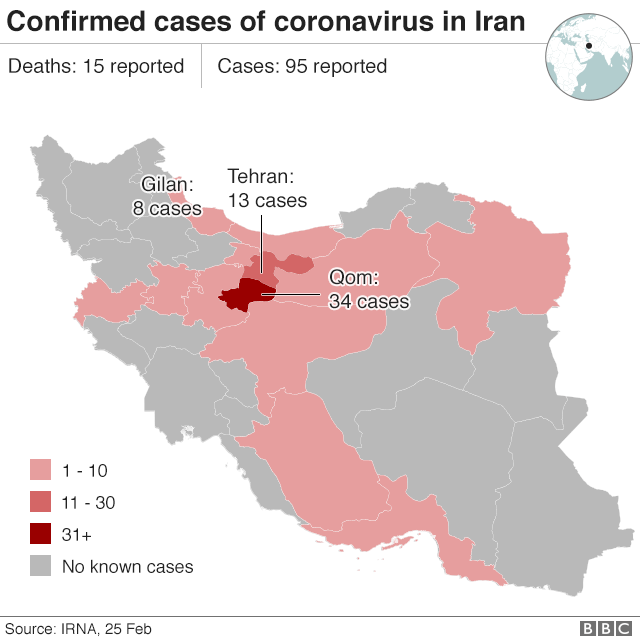

The death toll was rejected by Mr Harirchi, who vowed to resign if it could be proven that even half that number had died.
Mr Amirabadi-Farahani subsequently refused to retract his claim, saying he had sent a list of 40 people who had died to the minister and awaited his resignation.

More on the coronavirus outbreak
- How close are we to a pandemic?
- What you need to know
- A visual guide to the outbreak
- Tell us how you’ve been affected by emailing [email protected].

The secretary of the Supreme National Security Council of Iran Ali Shamkhani, said on Tuesday that he had asked the prosecutor-general to “check the validity” of the MP’s allegation.
“Both spreading fake news and hiding the truth disrupt national security and damage social capital,” he warned.
Could cases spread through the Middle East?
Iran is believed to have been the source of the first cases reported by neighbouring Afghanistan, Bahrain, Iraq, Kuwait and Oman, which have now imposed restrictions on travel to and from the Islamic Republic.
However there are fears that the many Muslim Shia pilgrims and migrants workers that will have travelled between Iran and other parts of the region in recent weeks could have already spread the virus.
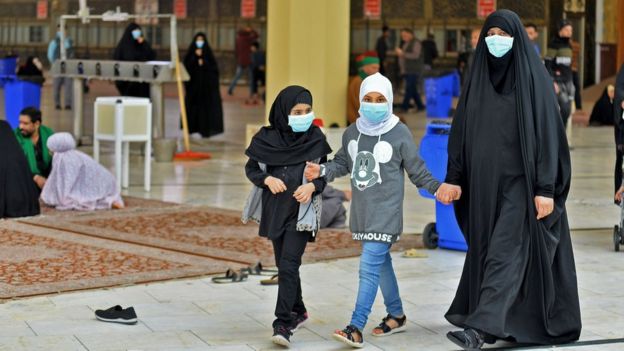 Image copyrightAFP
Image copyrightAFPThe WHO is sending medical supplies and additional testing kits to Iran and is also planning to send a technical team to the country.
Dubai Airport – a major international transit hub, and home to the airlines Emirates and Etihad – has suspended all passenger and cargo flights to Iran for a week “as a precautionary measure”. It has reported 13 cases, including an Iranian couple.
Bahrain’s health ministry meanwhile raised its number of confirmed cases to 17. It said all of those infected had travelled from Iran via the UAE.
![]()





